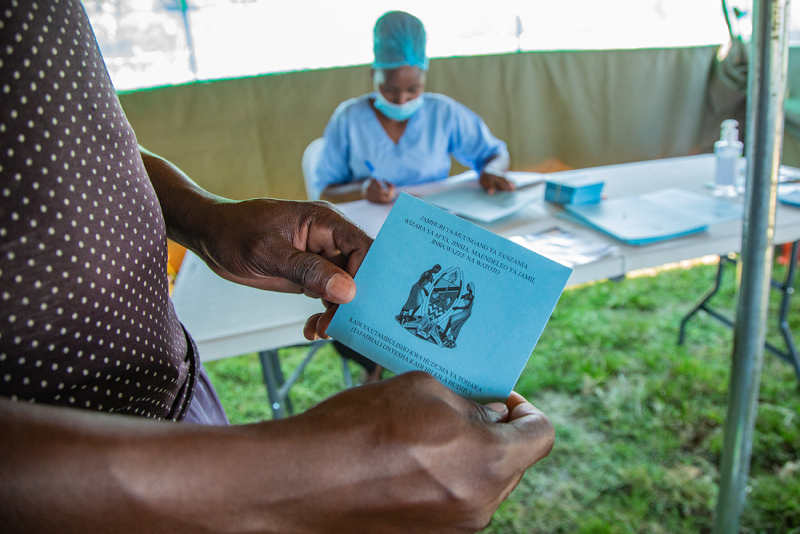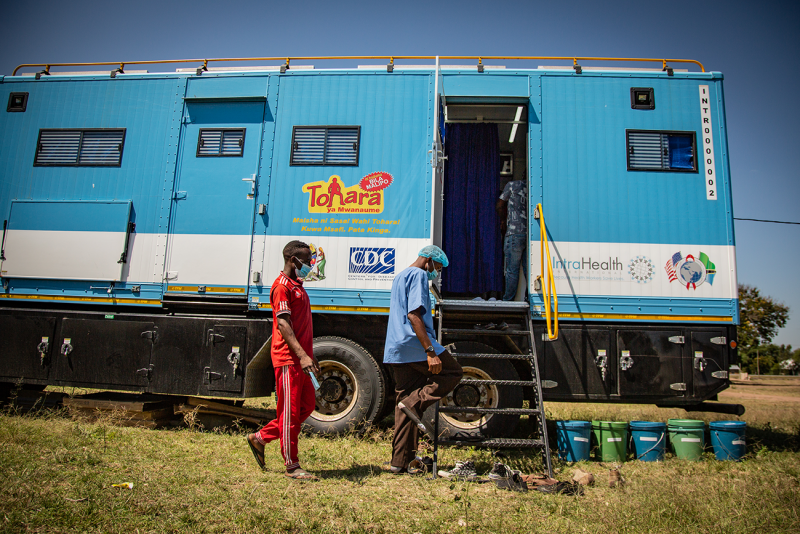Where We Work
See our interactive map


A client holds his patient card for before going into the mobile clinic van for HIV testing and the VMMC procedure. Photo by Rashid Hamis Kindamba for IntraHealth International.
More than 1.37 million clients have received high-quality voluntary medical male circumcision (VMMC) services for HIV-prevention in Tanzania over the past five years through IntraHealth International’s Tohara Plus project, one of the most successful projects of its kind.
Tohara Plus pioneered novel approaches using human-centered design to reach more clients with VMMC services, which lower a man’s risk of acquiring HIV through heterosexual sex by around 60%. Some of those approaches include:
By engaging men where they work or spend a lot of time—such as barber shops, mines, fishing camps, agricultural plantations, motorcycle taxi stops, and cotton ginnery factories—the program reached more clients and addressed behavioral barriers that might have kept them from seeking out VMMC services. The program promotes one-on-one engagement between potential clients and community volunteer agents, popular opinion leaders, local leaders, peer networks, and satisfied VMMC clients.
Tohara Plus works with workplace leaders and communities to co-design VMMC programs. The program has partnered with fisherfolk, beach management units, small-scale miners, sugar plantation and ginneries owners, and boda boda (motorcycle taxi) driver associations.
To reach remote areas of Tanzania, Tohara Plus deployed three mounted mobile clinic vans to expand “men-friendly” services for hard-to-reach adult men and high-risk mobile populations at highway truck stops and near mining and fishing communities. The vans also helped maintain services during COVID-19 by providing care in a project-controlled environment, reducing congestion at health facilities and minimizing the distance some clients must travel to access services.
Tohara Plus registered this WHO prequalified device—a process that recognizes the safety, quality, and efficacy of a product—in Tanzania, which makes the circumcision procedure safer and easier for clients who cannot easily return to their follow-up appointments.
Tohara Plus uses granular geostatistical models and real-time data to plan and monitor VMMC services.

A VMMC client, accompanied by Dr. Sosolo, enters the mobile clinic van in the Simiyu region of Tanzania. Photo by Rashid Hamis Kindamba for IntraHealth International.
Tohara Plus reached more men with circumcision services than any other VMMC partner in Tanzania.
By using these approaches and partnering with health workers throughout seven lake zone regions northern Tanzania, Tohara Plus has achieved the following results over the past five years:
The project also led a successful consortium that included two local partners—the Tanzania Youth Alliance (TAYOA) and IntraHealth’s local affiliate, Afya Plus—to create demand for and provide quality VMMC services among eligible males in the supported regions.
And when COVID-19 began to spread around the world in 2020, the project integrated COVID-19 prevention measures and vaccination awareness into VMMC routine services to ensure the safety of VMMC providers and clients and continuity of services.
“We owe our success to our partnership approach,” says Lucy Mphuru, Tanzania country director and project director of Tohara Plus. “We include stakeholders in every step of our processes to cultivate a high level of ownership and accountability. We ensured a uniquely transparent method of planning with clear roles, responsibilities, and a consensus on targets; a “moving together” through implementation approach; and side-by-side monitoring and problem solving to improve VMMC programming.”
With US President's Emergency Plan for AIDS Relief ambition funding Tohara Plus received in 2021, the project was able to identify and serve high-risk and hard-to-reach men over 24 years old, including fishermen. The proportion of males over 24 who were reached increased from 16% in 2020 to 26% in the beginning of 2021.
To read more about how Tohara Plus was affected by COVID-19 and how they quickly adapted to provide services during the pandemic, read What Does It Take to Keep HIV Services Available in Tanzania during COVID-19?, a Q&A with Lucy Mphuru, the project director.
Tohara Plus is a five-year project funded by the U.S. President's Emergency Plan for AIDS Relief (PEPFAR) through Centers for Disease Control (CDC) Tanzania to accelerate the scale up of VMMC services in seven Lake Victoria regions of Tanzania.



